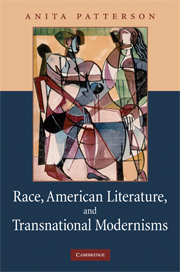Book contents
- Frontmatter
- Contents
- Acknowledgments
- Introduction. Towards a comparative American poetics
- Chapter 1 Transnational topographies in Poe, Eliot and St.-John Perse
- Chapter 2 Hybridity and the New World: Laforgue, Eliot and the Whitmanian poetics of the frontier
- Chapter 3 From Harlem to Haiti: Langston Hughes, Jacques Roumain and the avant-gardes
- Chapter 4 Signifying modernism in Wilson Harris's Eternity to Season
- Chapter 5 Beyond apprenticeship: Derek Walcott's passage to the Americas
- Epilogue
- Notes
- Bibliography
- Index
Chapter 4 - Signifying modernism in Wilson Harris's Eternity to Season
Published online by Cambridge University Press: 22 September 2009
- Frontmatter
- Contents
- Acknowledgments
- Introduction. Towards a comparative American poetics
- Chapter 1 Transnational topographies in Poe, Eliot and St.-John Perse
- Chapter 2 Hybridity and the New World: Laforgue, Eliot and the Whitmanian poetics of the frontier
- Chapter 3 From Harlem to Haiti: Langston Hughes, Jacques Roumain and the avant-gardes
- Chapter 4 Signifying modernism in Wilson Harris's Eternity to Season
- Chapter 5 Beyond apprenticeship: Derek Walcott's passage to the Americas
- Epilogue
- Notes
- Bibliography
- Index
Summary
INTRODUCTION
In May 1964, five years after immigrating to Britain, Wilson Harris addressed the London West Indian Students' Union on the subject of “Tradition and the West Indian Novel.” Over the course of his remarks, Harris observed the persisting relevance of Eliot's modernism. “The fact is,” he said:
even where sincerely held, political radicalism is merely a fashionable attitude unless it is accompanied by profound insights into the experimental nature of the arts and the sciences … There are critics who claim that the literary revolution of the first half of the twentieth century may well stem from the work of Pound and Eliot … [H]ow is it that figures such as these, described in some quarters as conservative, remain “explosive” while many a fashionable rebel grows to be superficial and opportunistic?
The dense intertextual and historical relations between Harris and Eliot are hard to miss. In 1960, the unsolicited manuscript for Harris's Palace of the Peacock was published in London by Faber, the firm that would subsequently publish all of Harris's novels, including a four-part series entitled The Guyana Quartet. More than two decades ago, Bruce King remarked, “If Wilson Harris has any direct forebear it is T. S. Eliot with his meditations on time and tradition, and his fragmentation of narrative into a mosaic of dissociated images and symbols expressive of the chaos of modern culture and of the individual mind attempting to piece together an encompassing vision out of personal disorder.”
- Type
- Chapter
- Information
- Race, American Literature and Transnational Modernisms , pp. 130 - 159Publisher: Cambridge University PressPrint publication year: 2008



